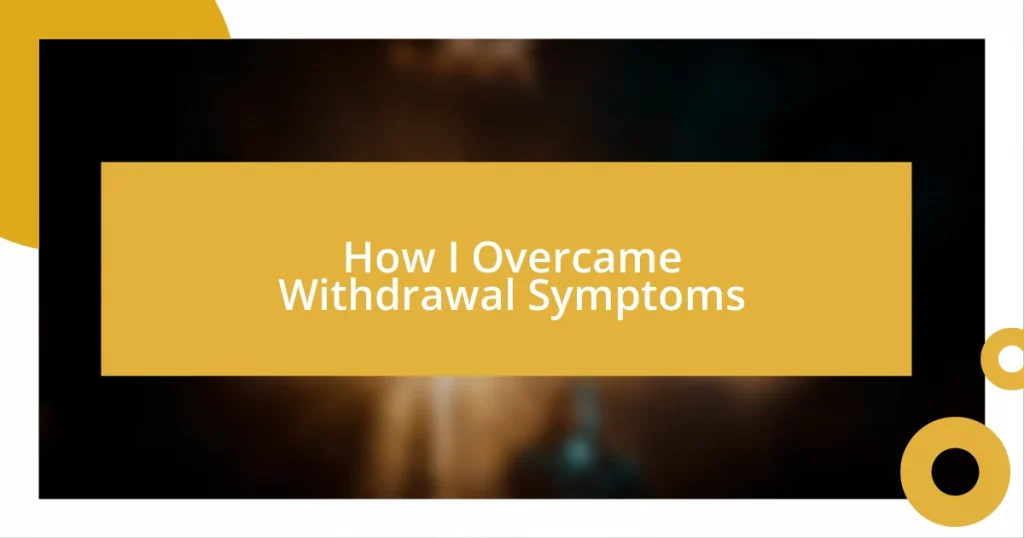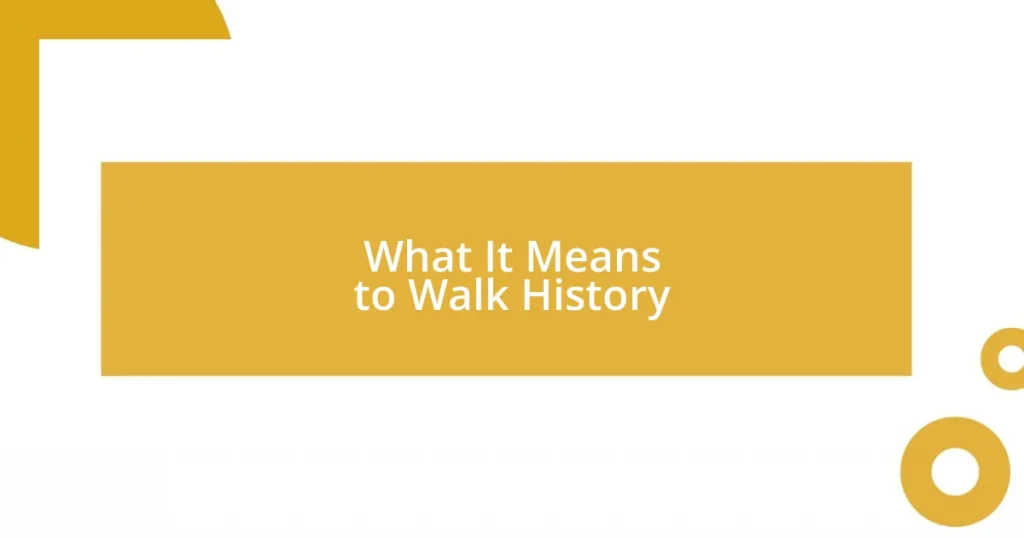Key takeaways:
- Understanding withdrawal symptoms is essential; they are both physical and emotional, and recognizing triggers is key to managing cravings.
- Building a robust support system through friends, family, and groups provides comfort and accountability during recovery.
- Celebrating small victories reinforces positive behavior, boosts motivation, and emphasizes the importance of self-compassion in the recovery journey.
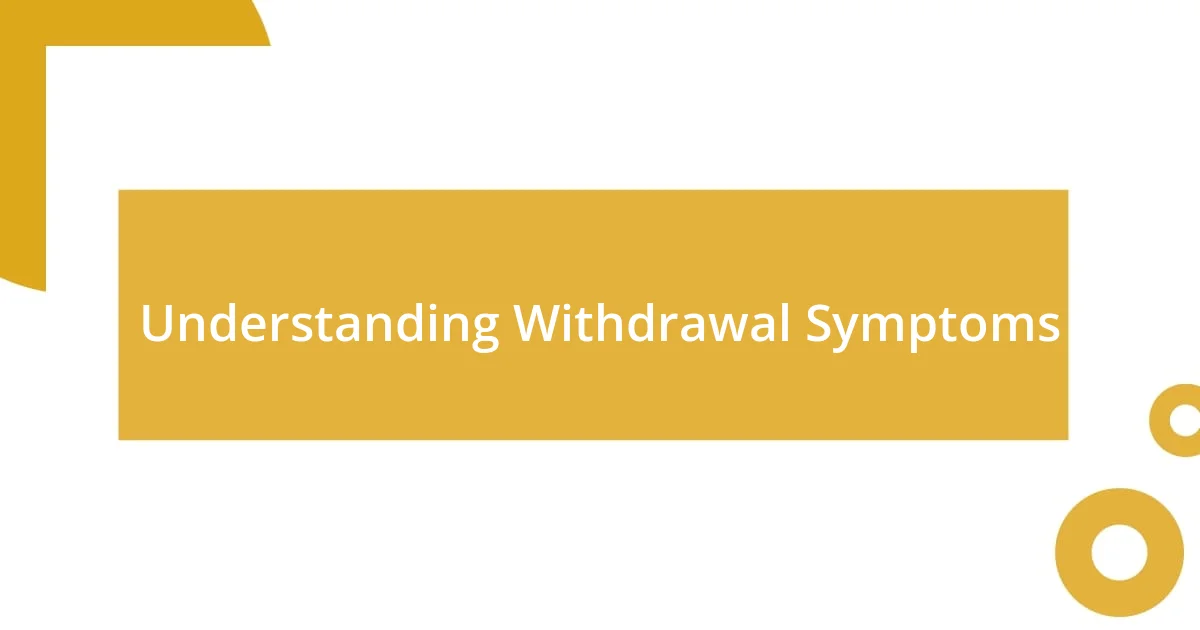
Understanding Withdrawal Symptoms
Withdrawal symptoms can manifest in various ways, often leaving individuals feeling vulnerable and overwhelmed. I vividly remember my own experience when I decided to break free from an addiction. The headaches and mood swings were so intense that I questioned if I had made the right choice. Have you ever felt that way during a major change? It’s a common sentiment.
These symptoms are essentially the body’s way of reacting to the absence of a substance it has grown dependent on. For me, the anxiety crept in like an unwelcome guest, making every thought feel unbearable. It’s fascinating how our bodies can become so conditioned; doesn’t that make you ponder just how much control substances can exert over us?
One thing I learned is that withdrawal isn’t just physical; it taps into emotional and psychological realms too. I found myself grappling with feelings of isolation and fear during those tough times. Have you experienced that? It’s crucial to recognize that while withdrawal can be daunting, understanding what’s happening in our bodies is the first step to overcoming those challenges.
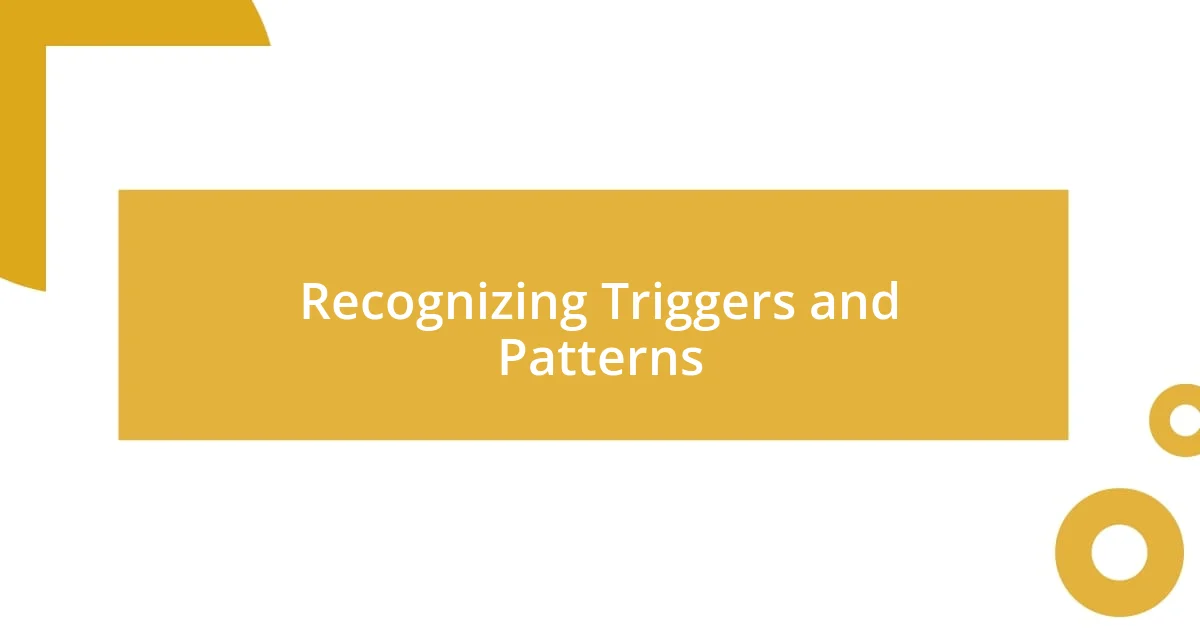
Recognizing Triggers and Patterns
Recognizing what triggers withdrawal symptoms was a transformative experience for me. I noticed that certain moments, like facing stress at work or social gatherings, would evoke cravings. It’s like my body had become accustomed to seeking comfort in the very substance I was trying to eliminate. Have you ever pinpointed those moments when your resolve feels weakest? Identifying these patterns was my first step toward gaining control.
Over time, I discovered that my mood greatly impacted my ability to manage withdrawal. There were days when I woke up feeling strong, but something as simple as a rainy day could leave me low. It was surprising to see how external factors played a significant role in my challenge. I began keeping a journal to track these feelings and triggers, which provided incredible insights into my emotional landscape.
Looking back, I realize how crucial it was to connect the dots between external situations and my internal responses. By observing how my triggers shaped my behavior, I managed to build strategies to cope effectively. It’s all about awareness, and I believe that recognizing these elements can lead anyone on a similar journey towards healing.
| Trigger | Emotional Response |
|---|---|
| Stressful situations | Increased cravings |
| Social gatherings | Feelings of isolation |
| Rainy days | Low mood |
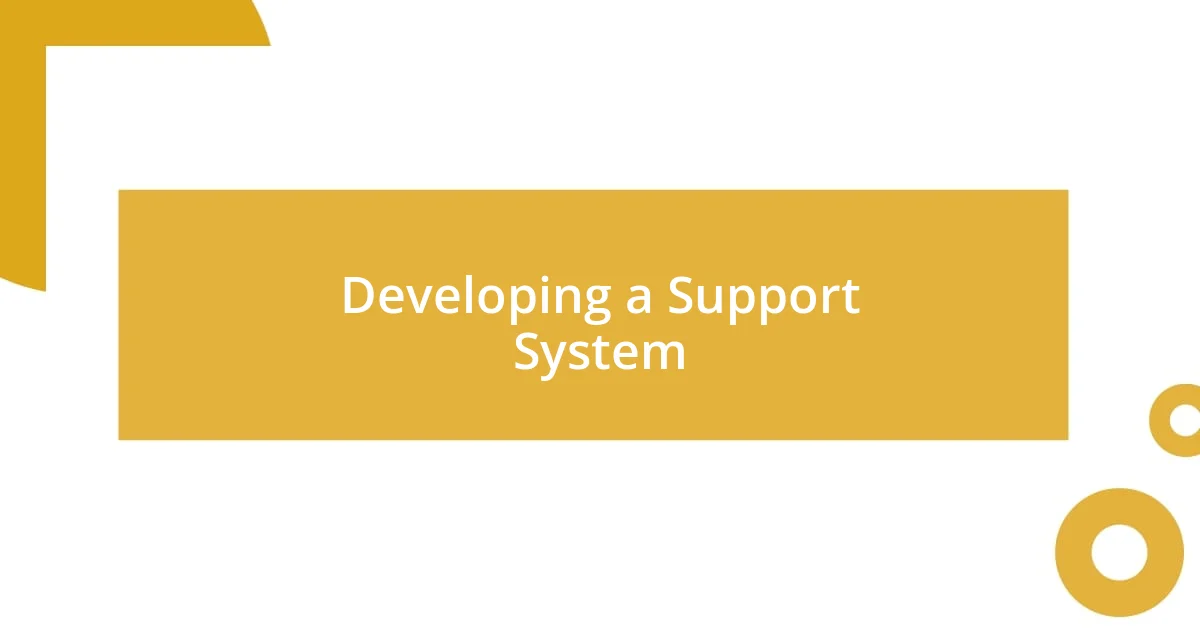
Developing a Support System
Developing a robust support system was one of the most significant steps I took during my withdrawal journey. I quickly realized that I didn’t have to walk this path alone. Just having someone to talk to, whether it was a close friend or a support group member, made my struggles feel more manageable. I remember the comfort of sharing my experiences — sometimes just hearing someone say, “I’ve been there too,” made all the difference.
Here’s a few strategies that helped me build that essential support system:
-
Join Support Groups: Connecting with others going through similar experiences allowed me to share not just my struggles but also my victories. Hearing their stories inspired me.
-
Reach Out to Friends and Family: I opened up to my loved ones about my journey. Their encouragement reminded me that I had people rooting for me.
-
Find a Mentor or Coach: Having someone who’s been through the process was invaluable. They provided not just guidance but also an empathetic ear.
-
Utilize Online Resources: Online forums and communities offered a wealth of support and advice that I could tap into whenever I felt vulnerable.
In hindsight, I see how crucial these connections were to my recovery process. The emotional weight began to lift as I shared my fears and celebrated each small victory with others who truly understood. This sense of camaraderie became a lifeline, guiding me through the tumultuous waters of withdrawal.
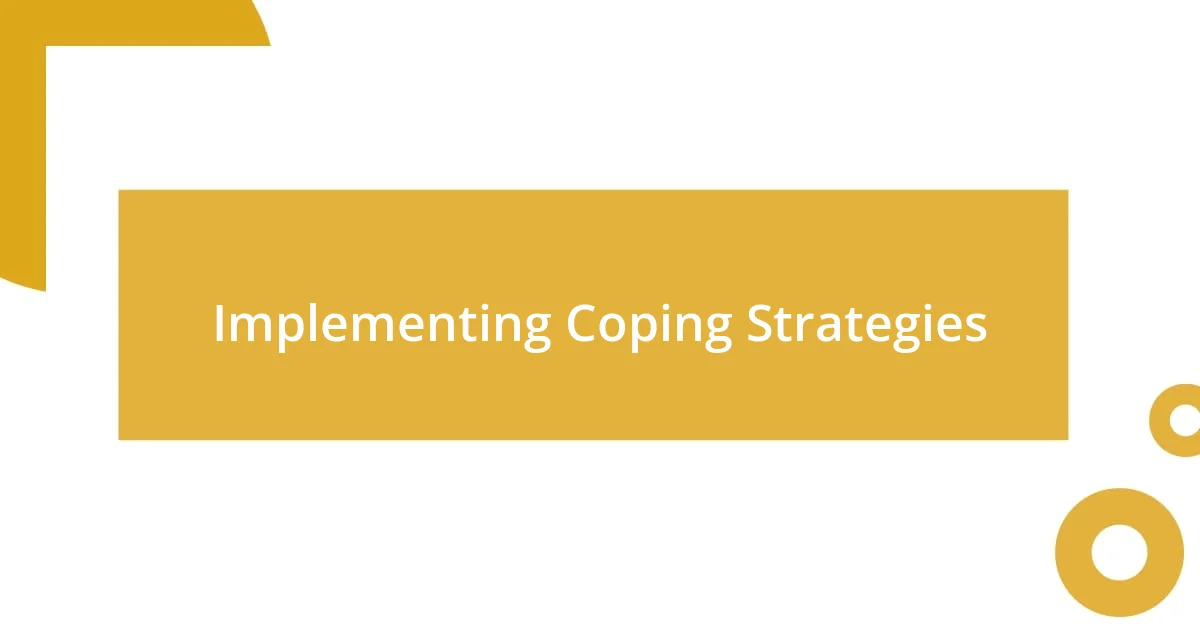
Implementing Coping Strategies
Implementing effective coping strategies was essential for navigating my withdrawal journey. One particular technique that I found immensely helpful was positive visualization. I would often close my eyes and imagine myself thriving in situations that used to trigger my cravings. For instance, picturing myself confidently socializing without the crutch of a substance made such a difference. Have you tried visualizing successful moments in your life? It’s a powerful way to reinforce your sense of control.
Another significant strategy involved creating a distraction toolkit. On days when cravings hit hard, I would pull out my favorite book or put on some uplifting music—a playlist I specifically curated for these moments. I remember one afternoon when I was about to give in; instead, I played my go-to song and danced around my living room. The sheer joy and freedom in that moment reminded me of the life I was working towards. Sometimes, I think we underestimate the power of simply changing our environment and energy.
Finally, incorporating mindfulness practices into my routine provided a crucial anchor. During morning meditation, I learned to observe my thoughts without judgment, which remarkably reduced my anxiety. It was interesting to discover how much more resilient I became just by being present in the moment. Have you ever experienced that shift when you focus solely on your breath? Those moments grounded me and kept me from spiraling into self-doubt, reinforcing my commitment to overcoming withdrawal.
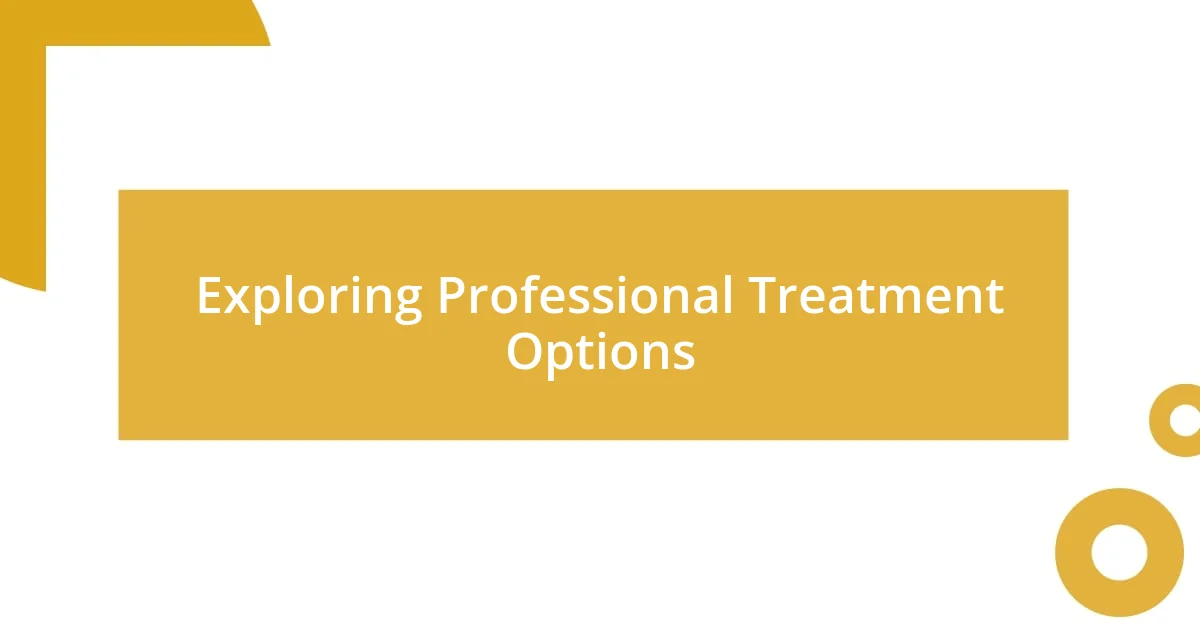
Exploring Professional Treatment Options
When I first considered professional treatment options, I felt a mix of hope and apprehension. I remember sitting down with a healthcare provider for the first time, feeling vulnerable yet eager for guidance. They introduced me to various therapies—like cognitive-behavioral therapy (CBT)—that helped me understand the underlying triggers of my cravings. Have you ever had that moment when a simple explanation opened your eyes? CBT transformed my thinking patterns, bringing clarity to what I once thought were insurmountable challenges.
Another option I explored was medication-assisted treatment. I was initially skeptical about medication—wouldn’t it just replace one dependency with another? After discussing it with my doctor, I realized that the right medications could ease withdrawal symptoms and support my brain’s healing process. I distinctly remember the first time I felt an actual reduction in my cravings, and it felt like a weight lifting off my shoulders. It was a refreshing reminder that this journey doesn’t always have to feel like a struggle; sometimes, there’s a sensible path forward.
Additionally, I found value in holistic approaches offered by certain treatment centers. I often participated in yoga and mindfulness sessions alongside my regular therapy. I can still picture the calm atmosphere of those classes, where I learned to connect my mind and body. Could integrating something like yoga into your routine bring you a sense of peace? For me, it offered a moment to breathe and reset, demonstrating that healing can encompass more than just mental techniques. Engaging those elements made my recovery holistic and, ultimately, more effective.
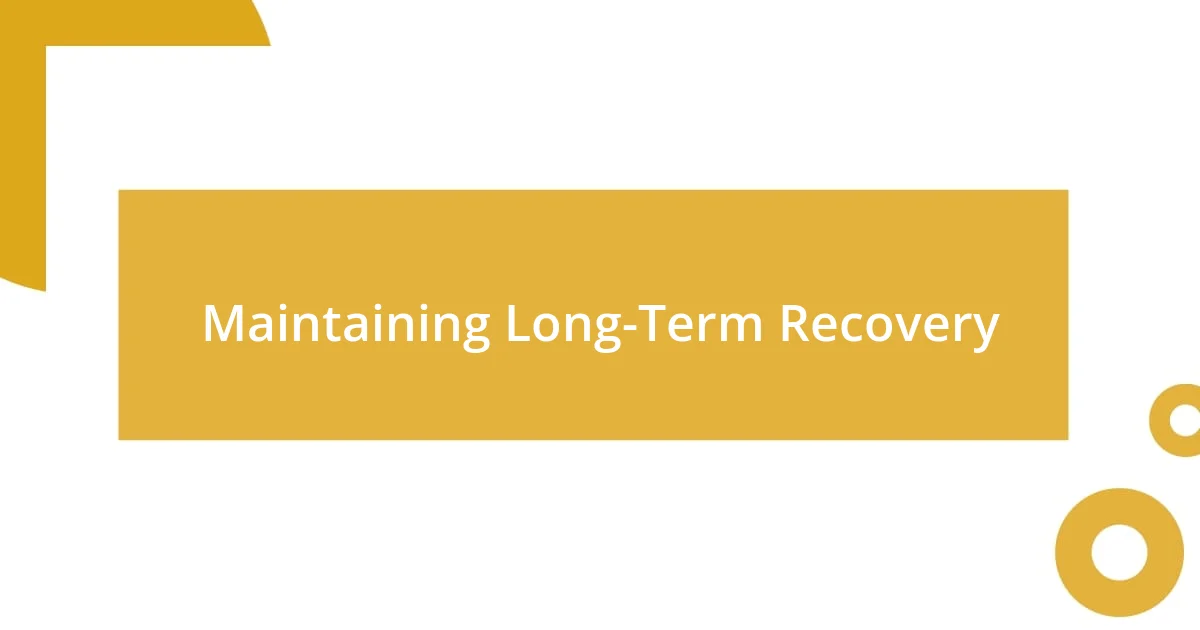
Maintaining Long-Term Recovery
Maintaining long-term recovery is a journey that requires continuous effort and mindfulness. Personally, I found that establishing a routine was vital. Each morning, I set aside time specifically for self-reflection and planning my day. I remember the peace that washed over me as I wrote down my goals, no matter how small they seemed. Have you ever experienced that sense of purpose in simply mapping out your intentions? It reinforces my commitment to stay on track.
Staying connected with a supportive community has also played a significant role in my recovery. I made it a point to attend regular support group meetings, where I’d share my experiences and hear from others. One evening, I vividly recall a heartfelt exchange with a fellow member about our struggles. It struck me how powerful it is to be surrounded by people who truly understand our journey. Have you ever felt that sense of belonging during difficult times? For me, these connections brought hope and accountability, reminding me that I wasn’t alone in this fight.
Finally, I discovered the importance of self-compassion in my long-term recovery. There were days when I stumbled, and that’s when I needed to remind myself that setbacks are part of the process. I embraced the practice of talking to myself like a friend would, offering kindness rather than criticism. I often asked, “What would I tell my best friend if they were in my shoes?” This simple shift in perspective helped me move forward where guilt and shame threatened to hold me back. How about you—what do you do to nurture your inner dialogue? For me, fostering self-love has been a crucial element in sustaining my recovery journey.
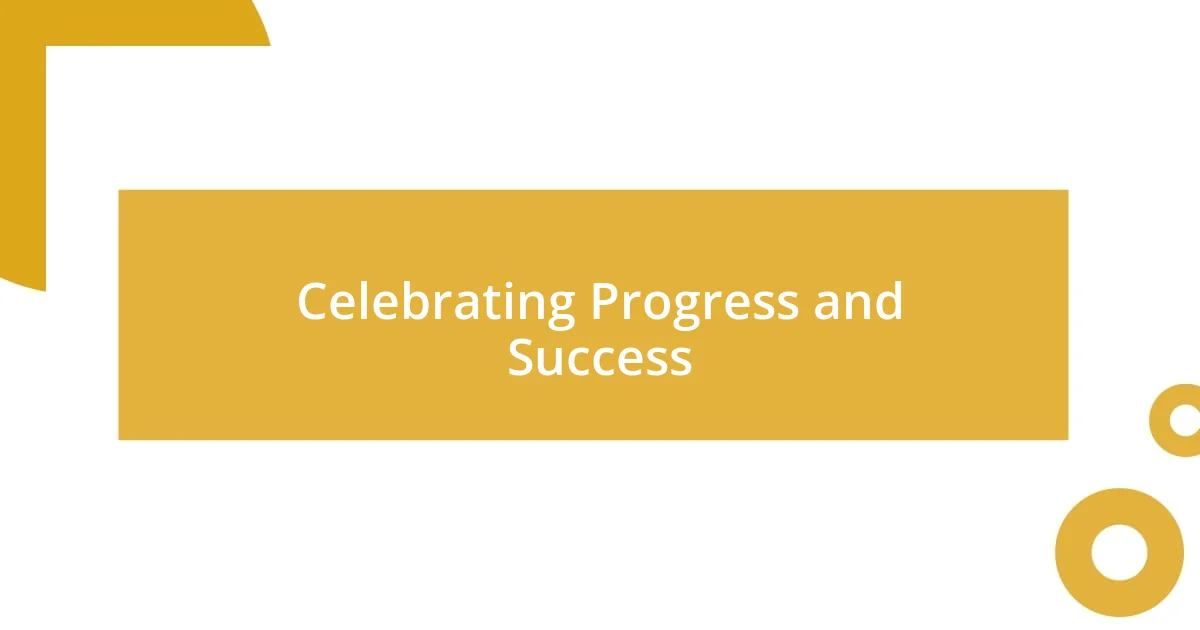
Celebrating Progress and Success
Celebrating progress is crucial in any recovery journey. I remember one particular day when I hit a milestone—two weeks free from withdrawal symptoms. I decided to treat myself to a small celebration. I bought my favorite dessert and sat in a cozy café, soaking in the atmosphere. Have you ever taken a moment to truly appreciate your victories, big or small? I found that treating myself reinforced positive behavior; it was a reminder that my efforts were worth celebrating.
Successes, even the tiny ones, deserve recognition. There were days when simply getting out of bed felt like conquering a mountain. I created a chart to track my achievements, from reducing cravings to attending therapy sessions consistently. Each small checkbox was like a mini victory dance for me. Wouldn’t it feel rewarding to visualize your progress? It certainly fueled my motivation, pushing me to strive for more, while also embracing the pace of my recovery.
Sharing my milestones with friends and family became another way I celebrated my journey. I distinctly remember calling my sister to share my progress, and her joy was contagious. Hearing her excitement mirrored my own and made the experience even more special. How important is it for you to have support during your recovery? For me, these shared moments turned milestones into communal celebrations, reinforcing the notion that I wasn’t just on this journey alone.










